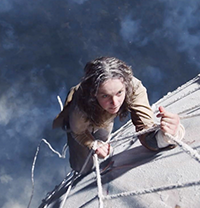
Tom Harper’s The Aeronauts is a nearly flawless family adventure that should be seen by everyone on the largest screen possible—except those for whom heights are a problem, and anyone who cares about historical accuracy. Eddie Redmayne and Felicity Jones re-team after their noteworthy turns in The Theory of Everything for another historical drama, this one centered on an 1862 English hot-air balloon expedition commissioned to break the French altitude record.
Redmayne plays reserved scientist James Glaisher; Jones is his spunky and theatrical pilot, Amelia Wren. During their hours-long ascent and return, they discover the ecstasy and horrors of advancing into nature’s yet-tested clutches. The result is a stirring movie about friendship’s ability to overcome societal and personal demons in the name of making the world a better place. Its beautiful and very convincing above-the-clouds backdrops also host some genuinely dizzying action sequences (I nearly passed out during two of them).
The hitch is that pesky “Inspired by a True Story” opening card. Narrative fudging is inherent to adapting real events for the big screen. But The Aeronauts takes a rather audacious step in erasing Glaisher’s true-life co-explorer, Henry Coxwell, from the story and substituting Amelia Wren’s whole-cloth heroine. While the leads’ chemistry is undeniable, and likely more cinematic than a Victorian bookworm bromance, this SJW shoehorning results in some conspicuous and anachronistically inclusive language that causes the film to infrequently bob on its ascent (“Our discoveries will one day make it possible for every man…and woman…to go higher than ever before!”). Even Jones’ character’s name is a hokey doff of the hat to real female pioneers (and, I suppose, birds).
Sure, The Aeronauts is “just a movie”, and one whose creators were, I’d guess, nobly intentioned. But imagine a twelve-year-old girl walking out of the theatre. Dazzled and inspired by the gutsy young woman who bucked expectations and advanced science, she asks her mom to take her to Barnes & Noble, where she will pick up Glaisher’s book The Aeronauts: Travels in the Air. Now imagine her dismay and heartbreak at not finding Amelia Wren within its pages—or those of any other book.
This integral character is a composite of flesh-and-blood pioneers Sophie Blanchard and Margaret Graham, both of whom died years before The Aeronauts take place. Why not tell their stories, and leave the Glaisher/Coxwell adventure alone? Despite this one (admittedly large) misgiving, I highly recommend Harper’s film as a breathtaking cinematic flight of fancy. But science is the ultimate quest for truth, and in an era where pundits clamor for more women in these fields, we endanger our future by tidying up the past to feel better about the present.

